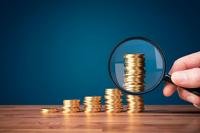Which type of card should you reach for in a wallet packed with plastic?
It can be tough to weigh the pros and cons of plastic. "On one hand, we've all heard the negative stories of someone who wasn't careful with their credit cards and got themselves in trouble," says Scott Halliwell, a certified financial planner ™ with USAA. "But on the other hand, there are potentially lots of benefits you can get from credit cards if you use them correctly. In fact, there are some situations where I'd pick a credit card over a debit card or even cash."
Halliwell shares his thoughts on which card works best for the kinds of purchases you want to make.
When to Use Credit
Pay with credit when you want to:
Shop online. Enjoy purchase protection, one of the biggest cardholder advantages. If an item never comes or arrives damaged, ask the credit card company to withhold payment. Debit card users would lose access to the money until any dispute is settled. "It often takes a while," Halliwell says.
Buy something big. Some credit cards offer warranty protection beyond the manufacturer's or store's coverage. Review specifics of your credit card agreement.
Establish a credit history. In an "ultimate Catch-22," Halliwell explains that some lenders hesitate to extend credit to someone with a limited history. But to build that history, a bank has to agree to extend the person credit. Some banks offer a secured credit card -- backed by a deposit made by you -- that can help you build a credit history, because debit card activity doesn't translate to your credit report.
Rent a car. Some credit cards offer collision damage insurance, so you can avoid the add-on coverage that rental agencies sell. (Check your card's exact coverage and exclusions.) Note that if you use a debit card, the rental agency could put a large deposit hold on your account, stalling access to your cash.
Stay at a hotel or go on a road trip. Some gas stations and hotels put holds on funds as a security deposit. Debit card users can't access that money for that period.
Score points. Credit card rewards programs can provide big-time benefits -- from airline tickets to cash back. But look for no-fee programs, and pay off balances each month to avoid interest charges. Otherwise, the "free" rewards will cost you. "This one gets a lot of people in trouble," Halliwell says. "They begin using a card for the rewards. But they find themselves carrying a balance and paying high interest charges."
When to Use Debit
Pay with debit when you want to:
Get cash fast. Access money at your bank's ATM or when you're paying for merchandise at the cash register without the fees and interest many credit cards charge for cash advances. But fast cash has drawbacks. "With people being able to access their cash on virtually every corner, it's easier to spend without a plan," Halliwell says. He often suggests people take out an entire week's planned spending at once. "When the money is done, so is their spending." If using cash isn't your thing, Halliwell suggests using online budgeting tools to track and plan your spending more closely. "That way you're still staying on top of things," he adds.
Avoid interest charges. Forget paying the interest that credit cards charge for carrying a balance. If you don't trust yourself that you'll pay off the credit card balance each month, using a debit card can eliminate that risk for you.
Buy something less than $50. Little expenses can add up quickly. Since debit card charges are deducted from your checking account, there's no risk of a surprise balance due at the end of the month.
Exercise control. "Psychologically, debit card users are probably less likely to overspend than credit card users because they can see the immediate results of their spending as bank balances go down," Halliwell says. They might not see a credit card statement for weeks.
Ultimately, each payment method is just a way to access hard-earned cash. One does it now, and one does it later. "So be thoughtful," Halliwell says, "when you pull any piece of plastic from your wallet."












